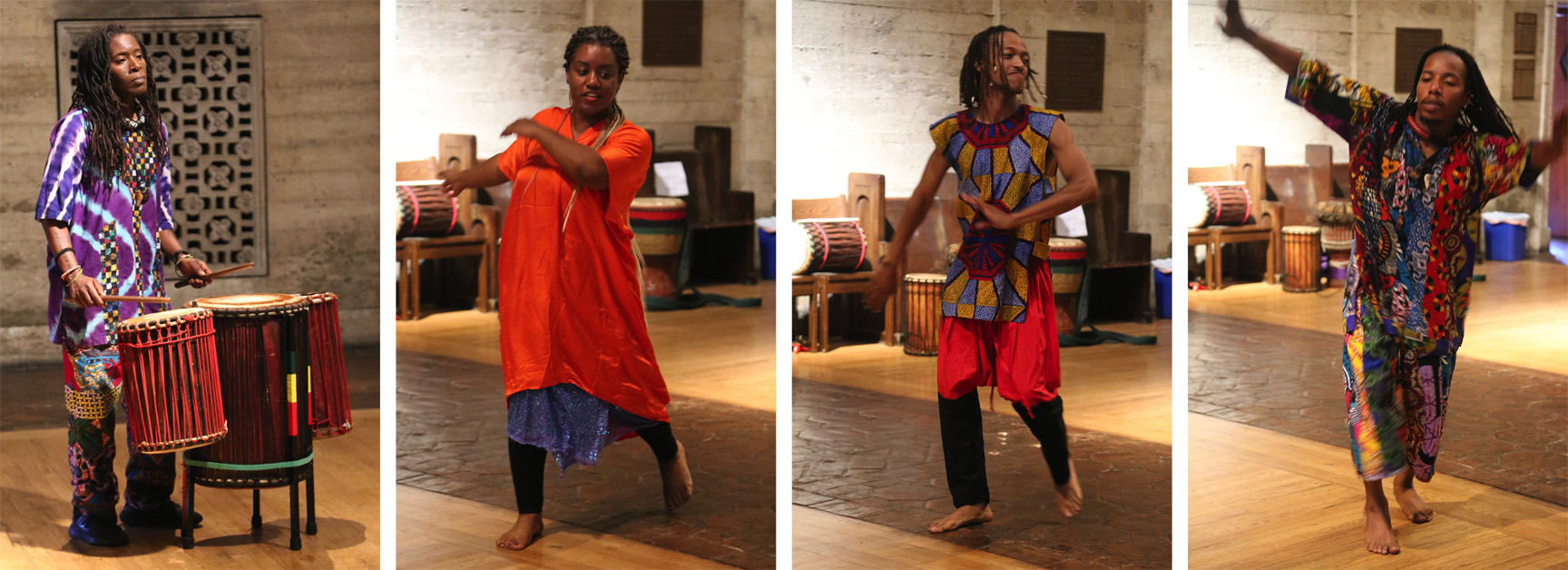
Dancers and a drummer from the Africa in America dance troupe add swirls of color and sound to the “Libation to the Ancestors” rite during the Juneteenth service on June 17. Photos: Janet Kawamoto
[The Episcopal News] “We gather today to remember so that we can tell our story to the generations that come after us. This narrative is ours … and if we don’t take ownership of it, others will do so for us,” the Rev. Stacey Forte-Dupré told Episcopalians and friends gathered June 17 at St. John’s Cathedral for the Diocese of Los Angeles’ second annual Juneteenth celebration, sponsored by the Program Group for Black Ministries and the H. Belfield Hannibal chapter of the Union of Black Episcopalians.
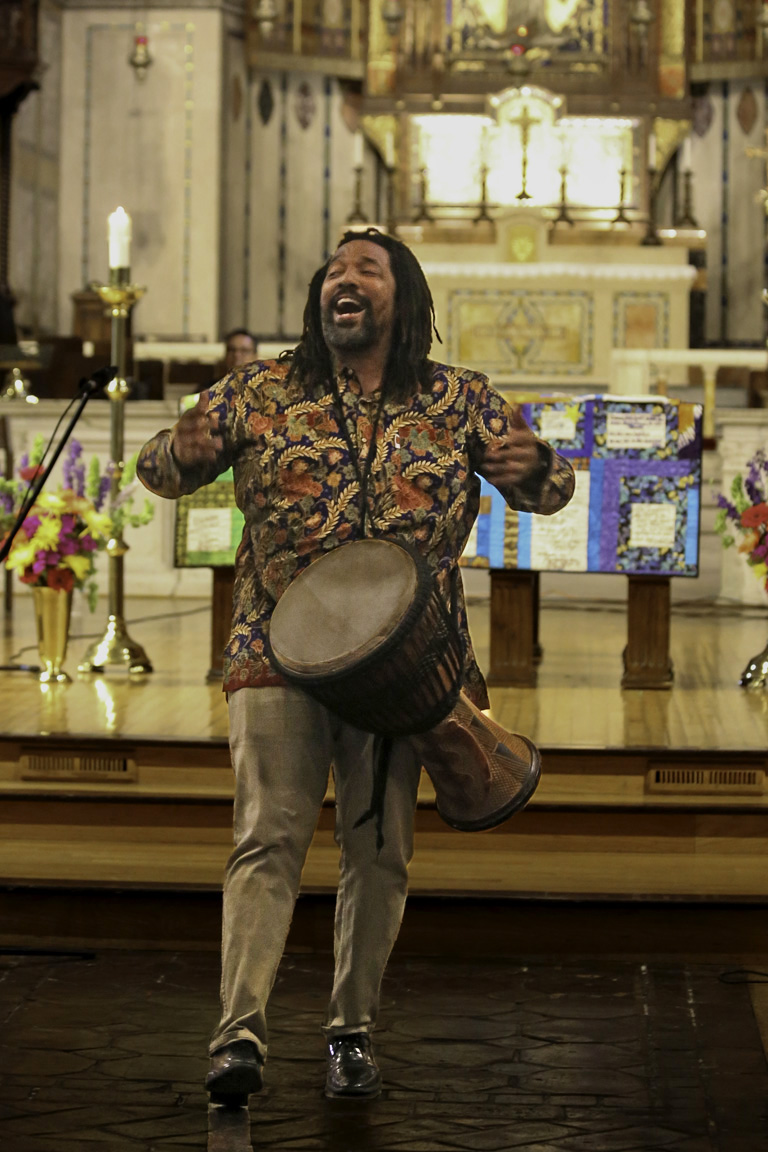
Lester Mackenzie leads a Tanzanian praise song at the Juneteenth service.
After the Civil War, enslaved people in Galvaston, Texas, received word on June 19, 1865, from victorious Union forces that the Emancipation Proclamation, signed by President Abraham Lincoln more than two years earlier, had declared them free. (Chattel slavery was abolished in the United States by the 13th amendment to the Constitution, adopted by the U.S. Congress in January 1865 and ratified by the required 27 states by the end of that year.) Juneteenth, long celebrated in various parts of the nation and recognized in all 50 states, was established by Congress in 2021 as a national holiday.
The Rev. Lester Mackenzie, rector of St. Mary’s Church, Laguna Beach, presided at the Evensong-inspired service, also leading a Tanzanian call-and-response song of praise. The Adrian Dunn Singers, a nine-member ensemble, provided gospel music, singing favorites such as “We’ve Come This Far by Faith” as well as compositions by Dunn. The group led the congregation in “Lift Every Voice and Sing,” informally known as the Black national anthem, to close the service.
The Rev. Guy Leemhuis, president of the L.A. UBE chapter, assisted by Rose West, national UBE Treasurer, offered a “libation to the ancestors,” invoking Americans of African ancestry whose names are known to history and requesting additional names from the congregation. Dancers and a drummer from Africa in America added swirls of color and sound.
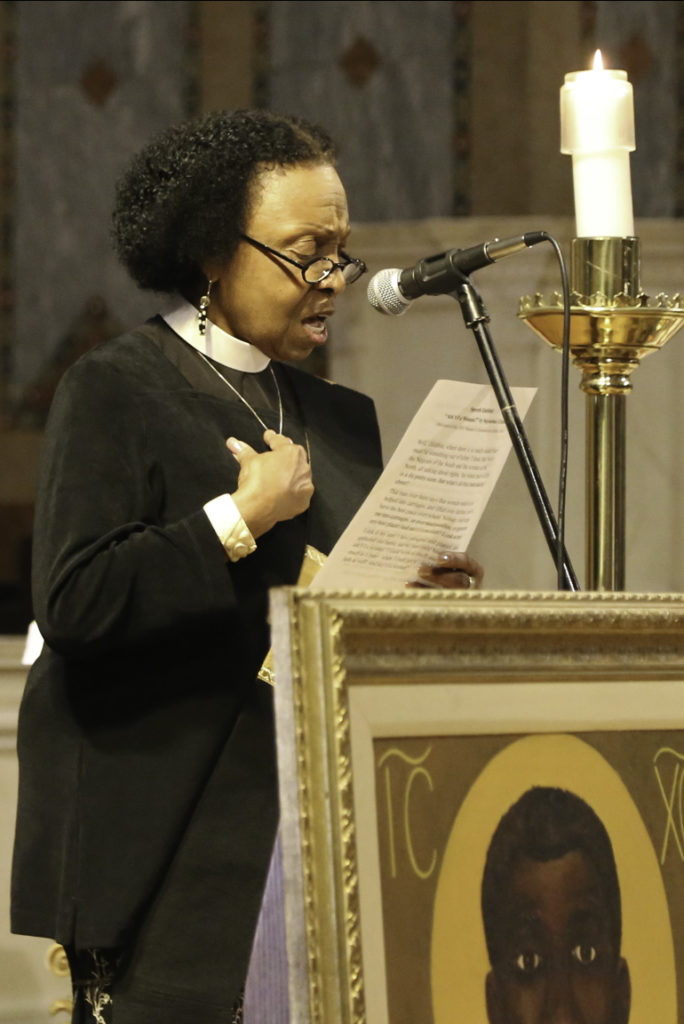
Deacon Margaret McCauley delivers a dramatic reading of “Ain’t I a Woman?” a famous speech by Sojourner Truth.
The Rev. Canon Margaret McCauley, deacon, read Sojourner Truth’s famous speech, “Ain’t I a Woman?” originally delivered to a convention of women advocating for the right to vote, that paired the evils of slavery and the suppression of women’s rights.
Biblical inspiration for Black Americans
In her sermon, Forte-Dupré, who serves congregations in the Riverside area, linked Juneteenth to the Jewish harvest festival of Sukkot during which the Hebrews would build booths to remind them of God’s shelter and protection after their escape from slavery in Egypt.
“Historically African Americans have found parallel and hope in the Israel liberation story and the groaning and cries of the children of Israel under the cruel treatment of Pharaoh,” she said. “And you see, they found hope because God was faithful in delivering them from the hands of their oppressors.”
She called on the congregation to remember the contributions of people of African ancestry because, she said, “America was built literally with their blood, sweat, and tears, their brains, and creativity.
“We gather today to remember so that we can tell our story to the generations that come after us. This narrative is ours. As African Americans, as Americans, as people of the African diaspora, we own this narrative. And the way that we share our story shapes our identity as a people and if we don’t take ownership of it, others will do so for us.”
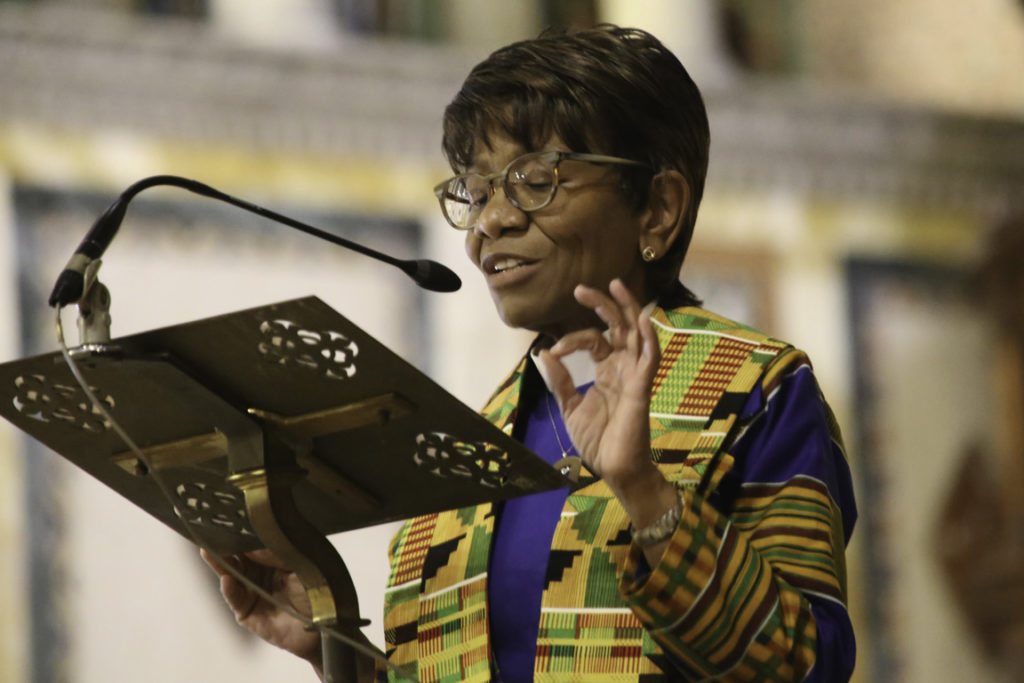
Stacey Forte-Dupré calls on Black Episcopalians to take charge of telling their own stories at the Juneteenth celebration on June 17.
She cited the late recording artist Tina Turner, who “was part of building and developing a genre of music; something new, something exciting, something that will last forever, something that is imitated – stolen, if you will – that people want to take credit for.”
Although Turner rebuilt her career and grew into a major star after leaving her abusive husband-manager, media interviewers, instead of focusing on her considerable achievements, chose to constantly ask her about the abuse, Forte-Dupré said. They “always sought to keep her a victim.”
“She hated that. And it was done almost to the day she died. So when … she was brought into the Recording Music Hall of Fame as Tina Turner, she said she was finally recognized for herself, something she had done.”
In the same way, Forte-Dupré said, Black people need to tell their own story. “If we don’t take ownership, someone will decide how to tell our story and no matter how much we accomplish, will always decide what it is that we should look like, sound like, be like, do like.
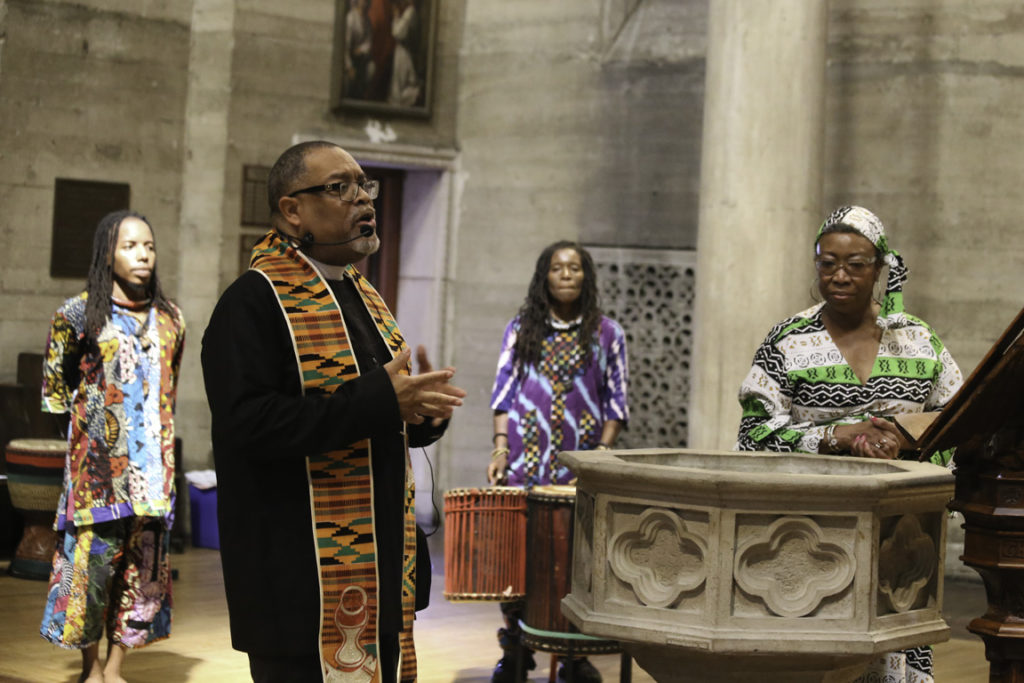
Guy Leemhuis leads a “Libation to the Ancestors” rite during the Juneteenth service, assisted by Rose West and members of the “Africa in America” dance troupe.
“Our history does not begin in slavery. It will not end in slavery. But we do not erase slavery from our narrative. We are more than that. … It is our lived experiences that make us who we are. … What we have gone through and overcome is part of our testimony. It is part of what makes us unique,” she said.
“Juneteenth is a time of both sacred lament and celebration. And so today, we gather to celebrate; to celebrate freedom. And you need not be African American to celebrate freedom or Juneteenth; we uplift, honor, and tell truth today.
Raising Black visibility in The Episcopal Church
In remarks before the offertory, Leemhuis told the congregation, “The Holy Spirit is calling into this diocese. There’s plenty of work to do for the Union of Black Episcopalians. Please don’t come to me and say, ‘what do we need to do in 2023?’ We have not overcome. We’re celebrating freedom today from slavery. We’re not celebrating absolute freedom. We have a qualified freedom. … We still have to speak out and we still have to make sure that we are not invisible as a community outside in the world and in our church.”
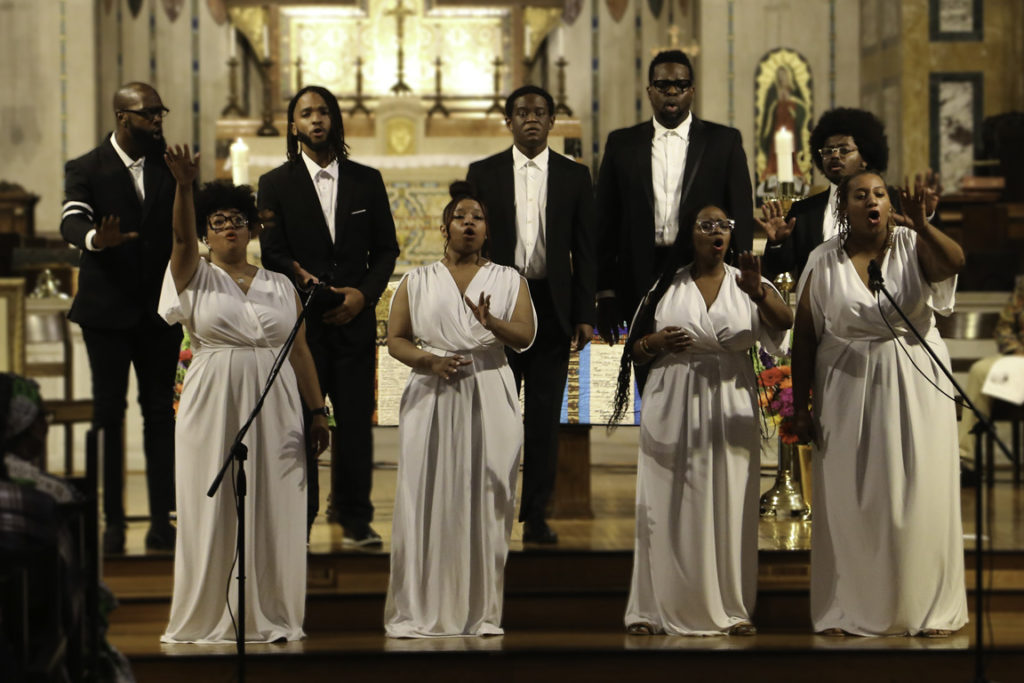
The Andre Dunn Singers perform at the Juneteenth service.
He called on them to invite their friends, their children and their grandchildren to return to church. If each person brought just one other, he said, that would double their presence. “And we go from having 60 to 85 people in the room to having 200 to 300 people in the room and then when we get up to 500 to 600 people in the room and then people are going to start saying, ‘I didn’t know there are that many Black Episcopalians.’”
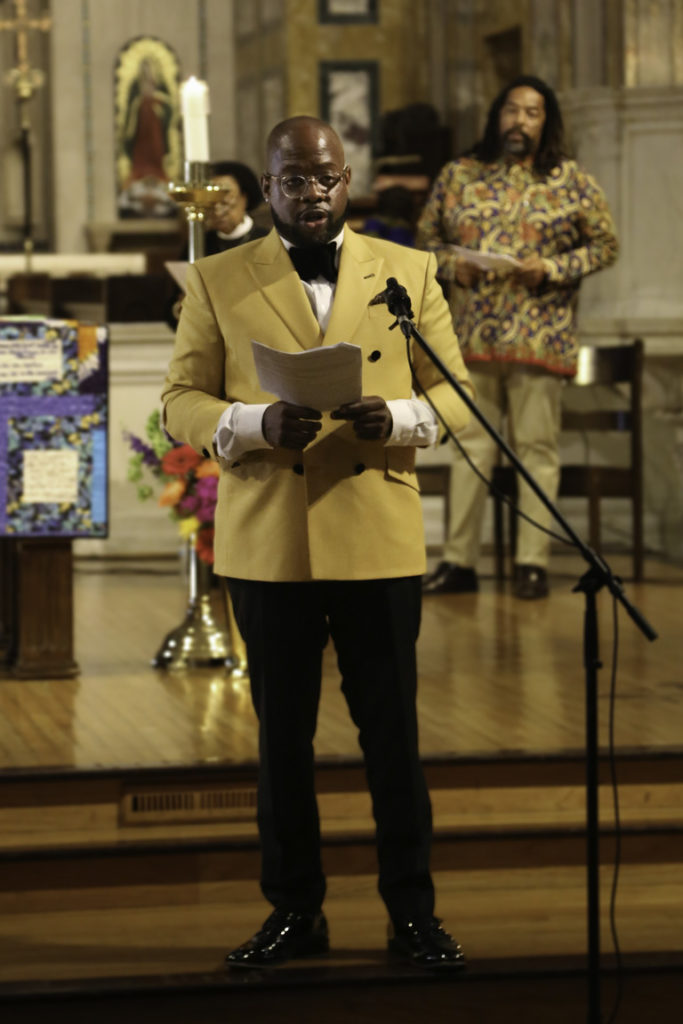
Adrian Dunn introduces his eponymous gospel ensemble.
He suggested each congregation acquire a print of the Black Jesus icon written by the Rev. Canon Warner Traynham, retired rector of St. John’s, that was prominently displayed during the service. (For information contact Leemhuis at gleemhuis@ladiocese.org.) He also invited everyone to join UBE, “because it’s a new day and we’re on a place that’s moving toward that kaleidoscope God that is going to shine down reign of love on all of us.”
Forte-Dupré also invited attendees to connect with the Black African Caribbean Ministry of The Episcopal Church’s Province VIII, which she serves as convenor and which meets every six weeks via Zoom. Citing a recent program focused on pioneering Black priest, scholar, civil rights activist and author Pauli Murray, Forte-Dupré said, “We’ve shared information on the province, on governance in the Episcopal Church, on how to gain leadership in the Episcopal Church. So, this is the type of programming that we offer and then we gather to fellowship. We gather to offer words of encouragement, to laugh together, to encourage one another, to keep the faith, to be together [with] black folk across the province. So join us.” (For information, contact Forte-Dupré at staceydupre@gmail.com.)
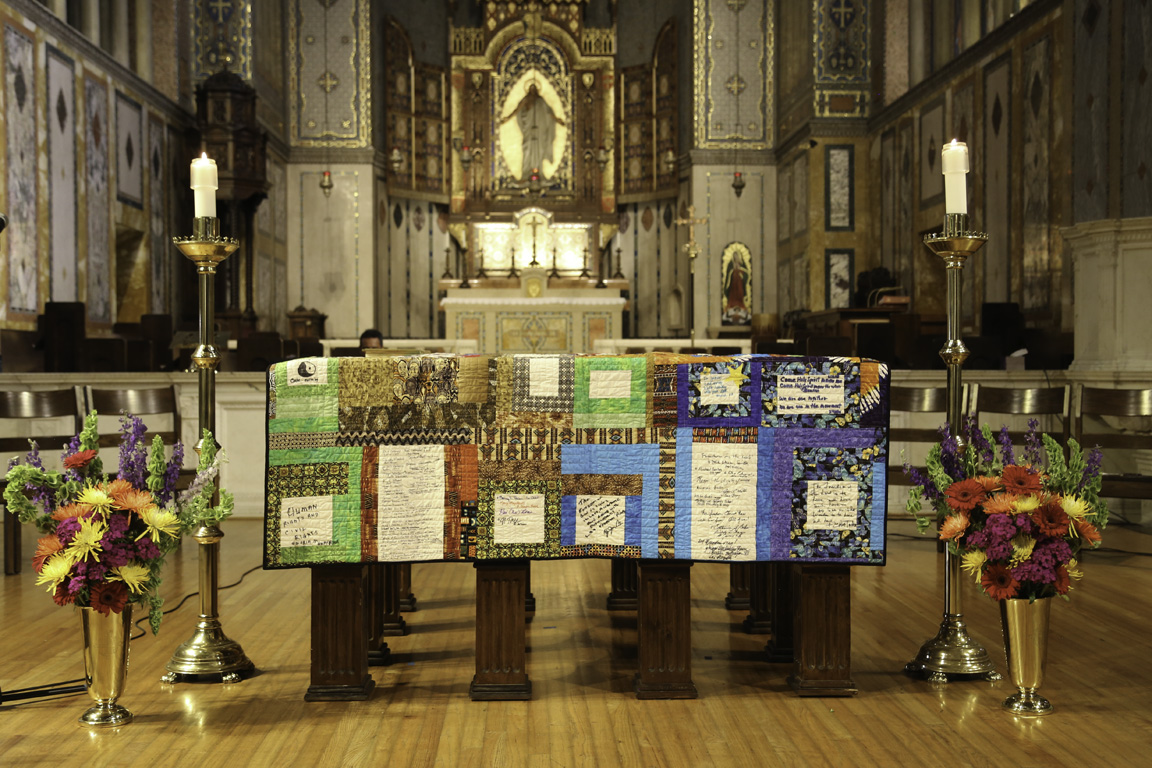
A quilt created by Deacon Jamesetta Hammons drapes the altar of St. John’s Cathedral at the Juneteenth service on June 17. Hammons, a longtime leader of the diocese’s Black community, incorporated quotations and signatures from church leaders into the quilt’s blocks.
